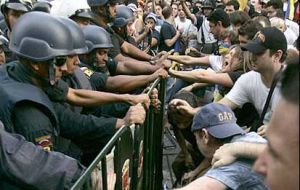MercoPress. South Atlantic News Agency
Venezuelan TV Station Goes Off the Air
 Supporters of RCTV took to the streets to vent their anger at Pte. Hugo Chavez's decision to close it.
Supporters of RCTV took to the streets to vent their anger at Pte. Hugo Chavez's decision to close it. Venezuela's oldest private television station went off the air just before midnight Sunday as thousands banged on pots and pans in protest against a decision by President Hugo Chavez that did away with a popular opposition-aligned channel.
Fireworks exploded across Caracas as crowds of Chavez's supporters celebrated his decision not to renew Radio Caracas Television's license and instead to award it to a new public service station. The studios of RCTV - the sole opposition-aligned TV station with nationwide reach - were filled with teary-eyed actors who embraced and shouted "freedom!" in the final minutes on the air. They bowed their heads in prayer, and a presenter declared: "Long live Venezuela! We will return soon." Then the national anthem was played and the screen turned black. Within seconds, it was replaced with the insignia of TVES, the new state-funded channel assigned to the frequency. Chavez says he is democratizing the airwaves by turning a "coup-mongering" network's signal over for public use. His opponents condemned the shutdown of RCTV as an assault on free speech and a blow to democracy. Police broke up one opposition protest using a water cannon and tear gas, and later clashed with protesters who set afire trash heaps in affluent eastern Caracas. Police said some protesters fired shots, and others threw rocks and bottles. Police said 11 officers were injured. Television stars at RCTV hosted an emotional on-air goodbye mixed with denunciations of Chavez's government. "We are living an injustice," said Eyla Adrian, a 35-year-old presenter, her eyes welling with tears. RCTV's top executive, Marcel Granier, said Chavez's decision "marks a turn toward totalitarianism." The socialist president and his supporters accuse RCTV of supporting a failed 2002 coup, violating broadcast laws and regularly showing programs with excessive violence and sexual content. In 2002, RCTV and other private channels broadcast opposition calls for protests to overthrow Chavez while giving scant coverage to Chavez's return to power amid protests by his supporters. Andres Izarra, who now heads the state-financed channel Telesur, said he quit his job as a newsroom manager at RCTV because he was disgusted with the way "everything was censored" during the coup. "The order was 'zero Chavismo on the screen.' Nothing related to Chavez, his allies, his congressmen, members of his party," Izarra said. "When I hear the owners of RCTV talk about freedom of expression, it seems to me a great hypocrisy." While fireworks crackled, thousands of red-clad government supporters gathered around giant screens set up in a Caracas plaza to watch the new channel's first transmission. Some danced to the classic salsa tune "Todo tiene su final" - "Everything Has Its End." The new channel, TVES, began its transmission with an orchestra playing the national anthem. Officials said that was to be followed with a live program including musical performances, and then a state-financed film about independence hero Simon Bolivar. RCTV, founded in 1953, was Venezuela's oldest private TV station and was regularly the top channel in viewer ratings. But Chavez called its soap operas "pure poison" that promote capitalism. Granier called his station's shutdown a flagrant abuse of power by Chavez. "He's losing more than he thinks he's gaining. He's losing international recognition and he's losing the respect of his people," Granier said, while hundreds of protesters massed outside the station chanting, "No to the shutdown!" Venezuela's Supreme Court has ruled that the replacement station can use RCTV's broadcasting equipment and told the military to guard it. Most Venezuelan news media are in private hands, including many newspapers and radio stations that remain staunchly critical of Chavez. But the only other major opposition-sided TV channel is Globovision, which is not seen in all parts of the country. Rafael Molina, president of the Miami-based Inter American Press Association, said "the concession of broadcast frequencies should not serve to reward or punish media outlets for their editorial line." Information Minister Willian Lara argued that RCTV was rejected because "it systematically violates the constitution. It is strictly a legal case." (AP)




Top Comments
Disclaimer & comment rulesCommenting for this story is now closed.
If you have a Facebook account, become a fan and comment on our Facebook Page!